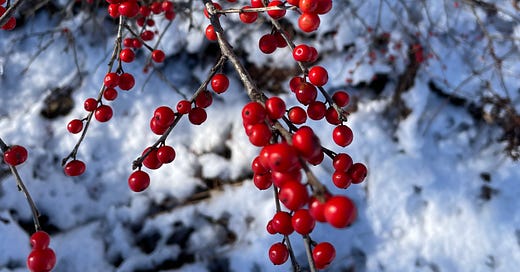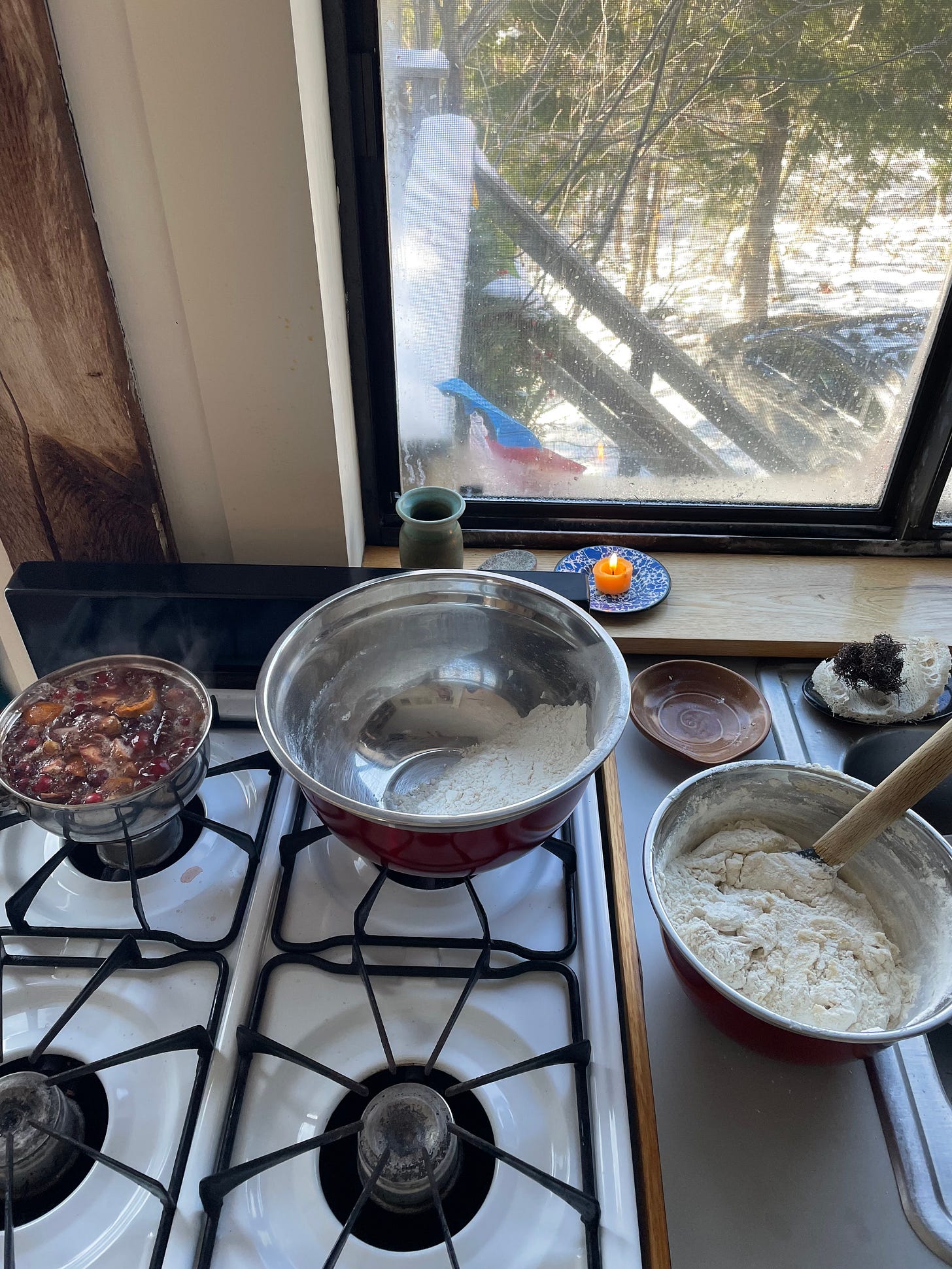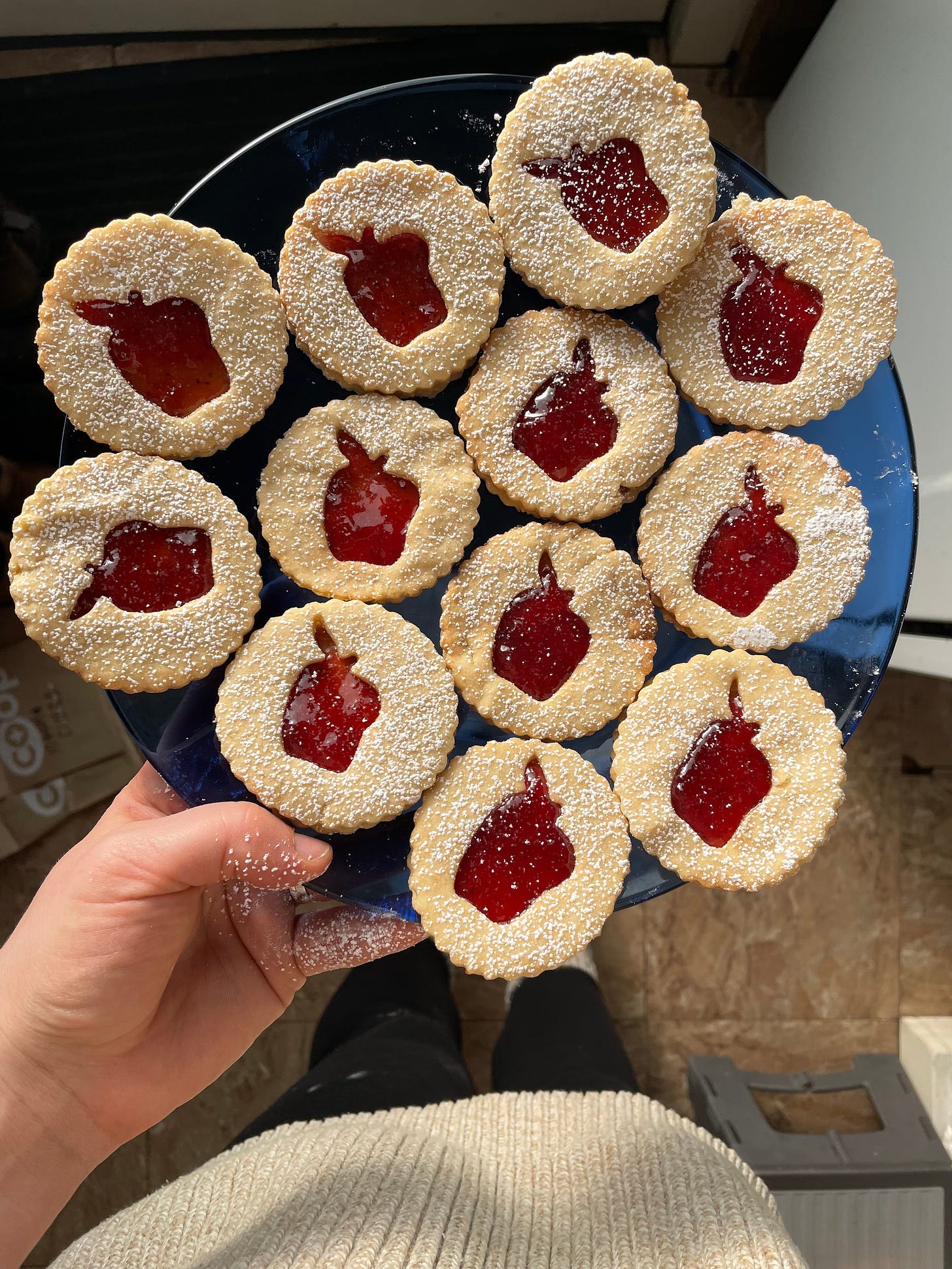Growing up we had two Christmas CDs that I now refer to as “sad Celtic Christmas music.” They are Celtic Christmas: A Windham Hill Sampler and Celtic Christmas II (also from Windham Hill).
When I was a teenager, these songs made me viscerally depressed. That is not hyperbole. Lots of music affected my sensitive wee mood negatively1, but sad Celtic Christmas music took the cake. It put an icy feeling in my chest and heavy weight on my shoulders. As the songs played, my mind would become filled with dark existential thoughts and something verging on nihilism.
Of course, I couldn’t verbalize any of that as a teenager. So from about the second week of December onward these songs would regularly play on the little grey CD player in the kitchen. On dark nights near Christmas, as the house was full with extended family and lit by Christmas lights, candles and a fire in the fireplace, I’d be filled with terror, thinking: None of this will last! None of this will last!
And it didn’t. People grew up. People moved away. Some people became so far-right leaning that it became difficult for other people to hold enjoyable conversations with them. The Christmases of my childhood—which were magical at times—did not last.
But you know what did? Celtic Christmas: A Windham Hill Sampler.
These CDs are essential holiday listening for me now. I had my husband buy me copies of both off of eBay just yesterday. I don’t even have a CD player. I just needed to make sure I have physical copies of them. I’m going to play the one (on my phone) while I make cookies this morning, after I work on this essay a bit.
A few years ago—the first COVID Christmas, if I remember correctly—I realized I was craving that darn sad Celtic Christmas music. I could not wrap my head around it. So I found it on Apple Music and played it and this time it did not make me depressed. In fact I enjoyed them! I was tapping my foot to the fiddle, and even remembering the sounds of the words in Gaelic.
It was like an echo from the past, but further back than just my childhood.
I understand now that many of the songs on these two CDs have nothing to do with Christmas. I think largely they are just tradition music from Scotland and Ireland. The one song is a waulking song.2
Some of my ancestors come from where these songs might have been played in their traditional form. My maiden name originated in the Scottish lowlands, in Peebles. I have a sibling’s 23andMe results as well, but I haven’t had the time or energy to discover much more.
And yet before I even really knew any of this, traditional Celtic songs pierced me at my core like no other music does. Maybe some of these songs my Scottish and Irish ancestors sang or could play.
As I step away from Christianity (which I am finding is even more of a process than I expected) I’m curious about my ancestors who lived without the influence of Christianity, and those who lived on the historical edges, with one foot in the old beliefs and one in the new story of a man called Jesus. How did those people navigate belief and life and the world without the influence of the Christian Empire? How did they celebrate this time of year, when there is so much darkness and we are waiting for the light?
I was raised to believe the worldview of these pagans was less valid. But now I just don’t see why that would be the case. People more in touch with the physical world around them? People who respected the trees, rocks, and landscapes? People who were no told, and so assumedly did not believe, that they were broken and depraved? Those sound like people I want to learn from.
꩜ Post (pre?) Christianity
This is my first Christmas not surrounded by the culture I grew up in and my third since I stepped away from Christianity.
And this year I finally got my way: no Christmas tree. I’ve been trying for years to convince my husband (and kind of also myself) that we do not need a tree.3 Now, I do like the tree and the ornaments and the whole deal, and our cats will nestle themselves so sweetly under it, which is nice to see. But this year, thanks to the diminutive size of our apartment, we don’t have a tree and I’m pretty pleased.
Why have I wanted to opt out of a Christmas tree for so long? It’s a nice tradition, really. But I’ve wanted so much to pare down our celebration of Christmas. To question all of it.
I think it’s just a feeling of: How many ways can we do this differently? Let’s not make any assumptions about how we have to do this! What do we really need in this season?
I made a note after Christmas 2023 and stuck it on the December page of my 2024 planner: Remember how you felt Christmas 2024! And how did I feel? Not good. I did not enjoy myself. I remember laying on a couch after, every muscle and bone saying: We needed celebration and observation of the season and this did not serve! I even tried that year to make it more of a holiday I would like, to do the things that seemed to matter to me. And yet it was so unpleasant that I made myself a note to remember not to repeat the mistakes of Christmases past.
What I want from this season now is expectations lessened, ritual increased, a sprinkle of old traditions, and a healthy dose of new traditions being made.
I thought this year I would be able to go all in on a yule season celebration, and I would write a bunch of essays about that. I would be forging new traditions! Turns out, that didn’t happen. This year is more of a palette cleanser.
So this year we have out our felt chain I made last year and Christmas lights and the little felt mistletoe. But that is about it. Oh, and an evergreen branch in a jar of water. On Christmas day we will walk in the woods. And for this year, that is enough.
꩜ Gold, frankincense & myrrh
I work in the office of a naturopathic doctor now, and it’s a small office so it’s just me and the doctor herself. We have lots of great conversations and I’m learning many things.
Somehow the topic of myrrh came up one day last week. As in: gold, frankincense and myrrh. That kind of myrrh. And despite my thirty-one years of parroting the words gold, frankincense and myrrh for basically the whole Christmas season I did not know what myrrh really is. (Let’s remember, I even played the baby JC in the Christmas pageant my first year of life. I was given gold, frankincense and myrrh in a sense.) It was never explained to me why baby Jesus was given these seemingly random items. I mean, the gold speaks for itself I guess.4 But the other two things…
As I was chatting with my boss that day about myrrh I sort of rapidly fired off some questions about myrrh. Wondering aloud, as it were. “What even is myyrh? Is it a plant? Where does it come from?” That sort of thing. And my boss watched me in amusement.
Because she knows all about myrrh. It’s a gum-resin extracted from a tiny, thorny tree in the Burseraceae family. It’s an excellent wound healer.
Now why exactly would the baby Jesus need a wound healing medicinal resin? Seems odd.
But it got even more interesting. My boss, the naturopath, contended that she thought the gold was actually turmeric. And frankincense? Well its botanical name is Boswellia and in the clinic where I work we sell it (both in capsule form and in a very nice lip balm). It’s not a mysterious thing brought by men from the east. It’s a plant medicine that helps reduce inflammation.
Are you listening? It helps reduce inflammation. So does turmeric, and that’s not even all turmeric does. So you’ve got two inflammation-bringer-downers and a wound healer. Why would a newborn baby need that?
Well, a baby wouldn’t… But a newborn mother would. Turmeric, boswellia and myrrh would have been great postpartum healing medicinals for a new mother.
And so, maybe the three wise men weren’t men at all. Maybe they were midwives. And maybe what they brought with them were herbs to help Mary recover in her postpartum.
The point is not whether this take is right or wrong, because —like with all stories of the Bible—we cannot possibly know what happened. There are already two accounts of the birth of Jesus in the Bible and they do not always agree with each other.
The point is: How does it feel to consider this possibility?
As a kid in the church I was not told why the “three wise men” brought these gifts. Just ‘cause! Shhh, don’t ask questions! Well, that felt awful. A plot hole in our most critical story and we can’t even talk about it? Unnerving.
I seem to remember that the “best” explanation I was given came much later. I was told it was foreshadowing of Jesus’ status has lord and his eventually death, because frankincense and myrrh were used in the body preparation process after death (which I’m not 100% sure is even true). But at any rate the foreshadowing theory does not make a bit of sense to me. God had three men go out of their way to bring these gifts to a random couple and their baby in a barn for foreshadowing’s sake??? That just seems mean.
But three midwives hear that a teenage, first time mother gave birth in a barn in some random town she happened to be in when she went into labor, so they go to tend to this mother with three decent postpartum herbs? That makes sense. That makes so much sense to me that it’s beautiful and I tear up a little when I think about it. When my boss told me this, something inside me went: There it is!
But in the church this tableu would be totally, utterly invalid. It would be heresy, I suppose.
No one knows what happened that night. Even Matthew and Luke didn’t agree, and they were recording it long after the fact. But I can tell you that the narrative I present cannot even be spoken of in the church. Isn’t that absurd? To go “well, maybe actually…” or “I wonder if…” or “maybe it was turmeric…” means to question the entirety of Christianity.
The Biblical writers could not seem to fathom (or did not think it would serve their ends) to say that a woman and a body was taken care of that night.
But what happens now, in our bodies, if we go: Well, maybe…?
꩜ Embodiment
It struck me some years ago, as I was leaving the church and reading Scott the Painter’s lovely Honest Advent5, that the Christmas story is one of embodiment. For some reason this came to me when I was thinking about Mary and Elizabeth meeting and there being womb awareness between them. Scott also talks in his book about the reality of Mary of giving birth—not a tidy thing, birth, and yet it’s so sanitized in the Christmas story. And, ultimately, what is God doing in the Christmas story but becoming a body?
Why water it all down? Well, I think, one: the Bible was written by men in a time when female bodies were even more demonized than they are now. And two: having gone through a process of becoming re-embodied since leaving the church, embodiment is a powerful and empowering thing.
As embodiment expert Phillip Shepherd defines it6:
Embodiment isn’t about sitting in the head and paying attention to the part of you we call the body—it’s about fully inhabiting the intelligence of the body and attuning to the world through it. It’s about listening to the world through the body. It’s about feeling the world through the breath. For our purposes, then, we might say that embodiment is a state in which your entire intelligence is experienced as a coherent unity attuned to the world. In that state any distinction between ‘mind’ and ‘the body’s energy’ becomes meaningless.
But you don’t ever hear a Christmas Eve sermon about that, do you?
꩜ Simple Phrase
There is so much I can’t explain this season.
I felt the sad Celtic Christmas music in my body. First, when I was disembodied it hurt. Then, as I was coming into my body and separating myself from an authoritarian religion, it felt like a touch of home.
I will no longer celebrate a season in a way that makes me feel awful and disembodied.
The Christmas story is one of my embodiment. God became a body. Mary had a body that needed care. Perhaps, though the story has been erased, she was given that care.
I had plans to make this year full of new traditions but everything told me No, just be quiet this year.
So this yule season, I’m offering this (not really) simple phrase:
Why do you do what you do and why do you believe what you believe?
What is deeper?
What can you not look away from?
What does your body say?
꩜꩜꩜
So much so that I stopped listening to music entirely for about a year.
Think this scene in Outlander:
We have only ever gotten a live, cut tree because that’s what we both grew up with.
Except for the fact that it presents a MAJOR plot hole in the nativity story. Mary and Joseph don’t get the gold and then go buy a nice big house with it. Jesus still grows up a carpenter, seemingly not well off. Where did the gold go???









Love to hear how you’re making your own traditions 💞 I may need to write myself a note for next year - “remember how you hate obligatory gifts!”
I’m looking up those Celtic songs for sure! On our Yule night while we wrote wishes and threw them in the fire I played the song “snow hare” from spell songs & my kids thought it was eye-rollingly weird 😆 hopefully they remember it fondly and not as the crazy tradition mom made them do that made them feel spooky and existential!
I also love all of that about the midwives - and it gave me the perfect inspiration for what card I am going to send you next. Sorry it’s taking me so long to write back 🫣
I had not heard about the gold/turmeric connectiun Ema and it makes a lot more sense. As you mention in the notes: Where did the gold go?